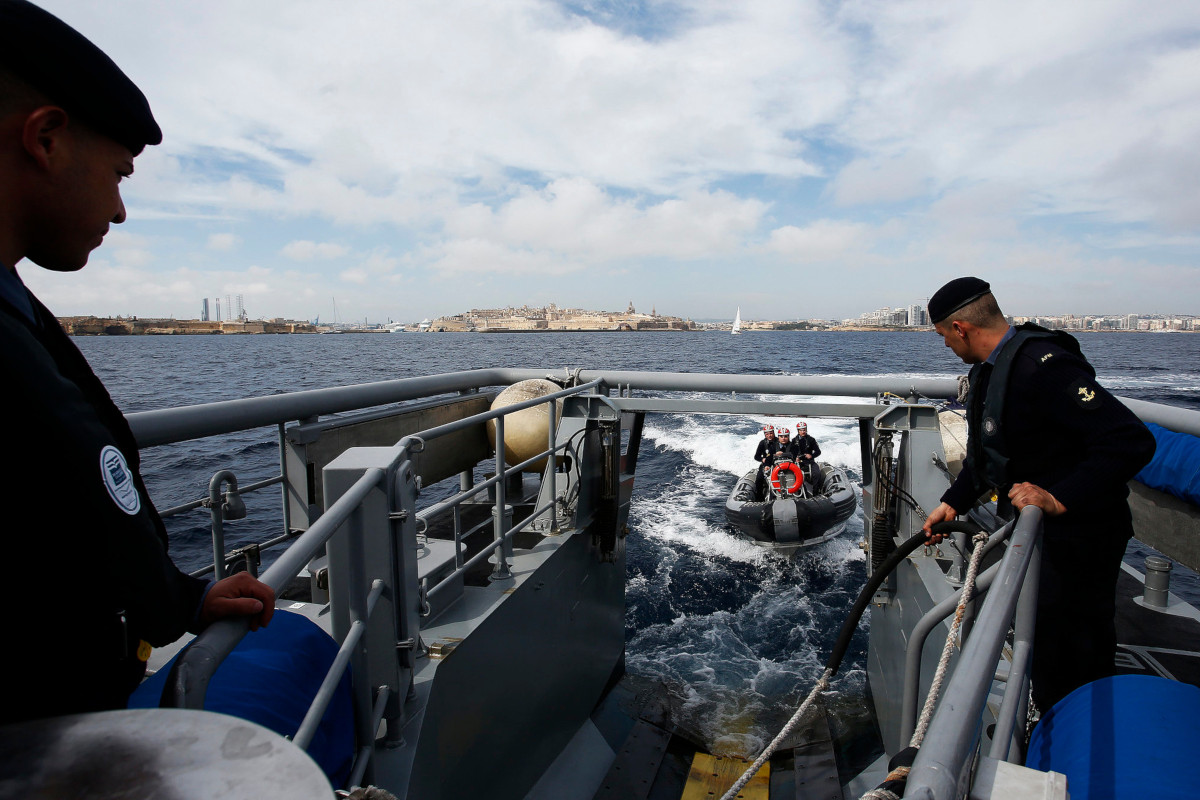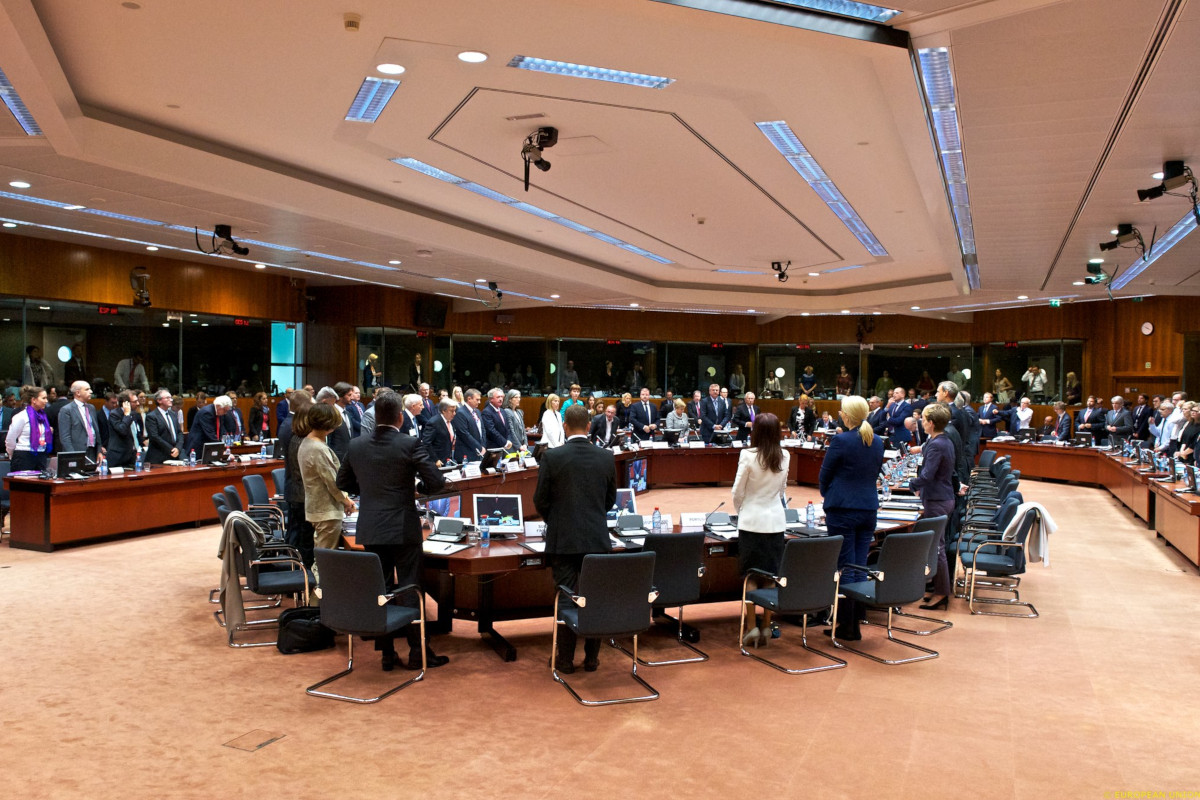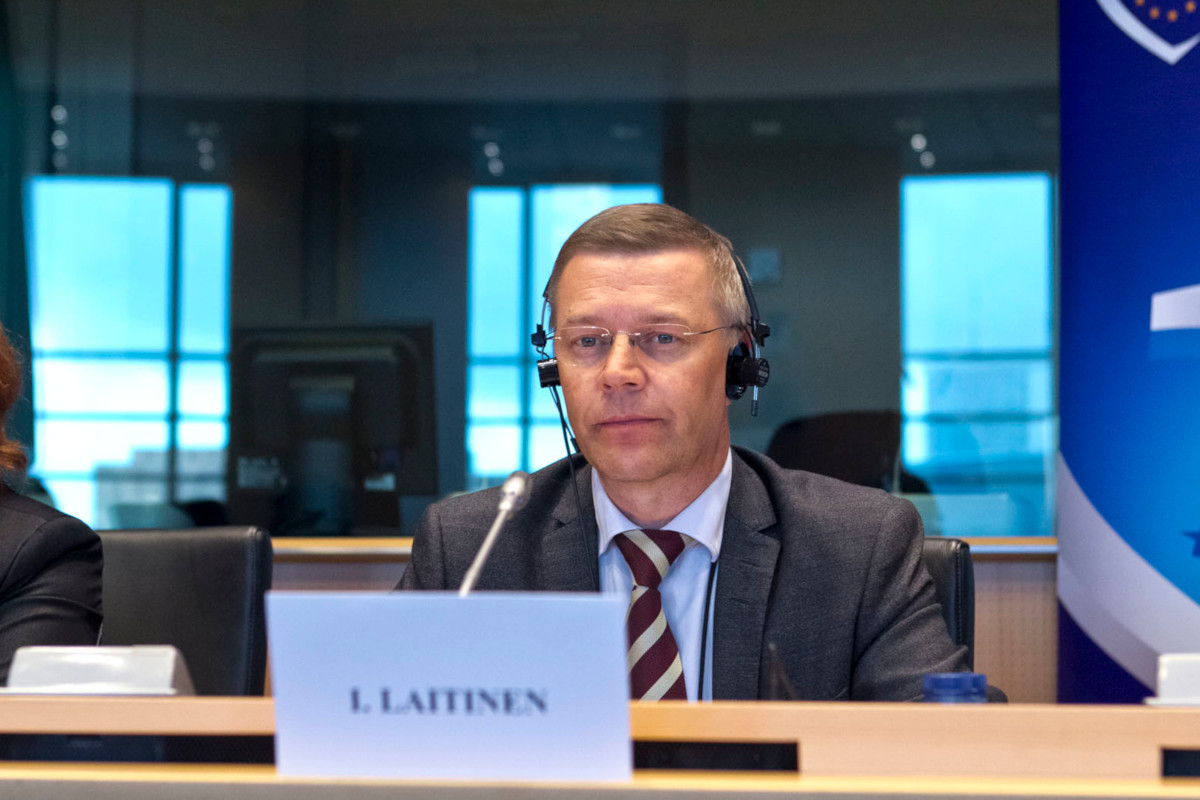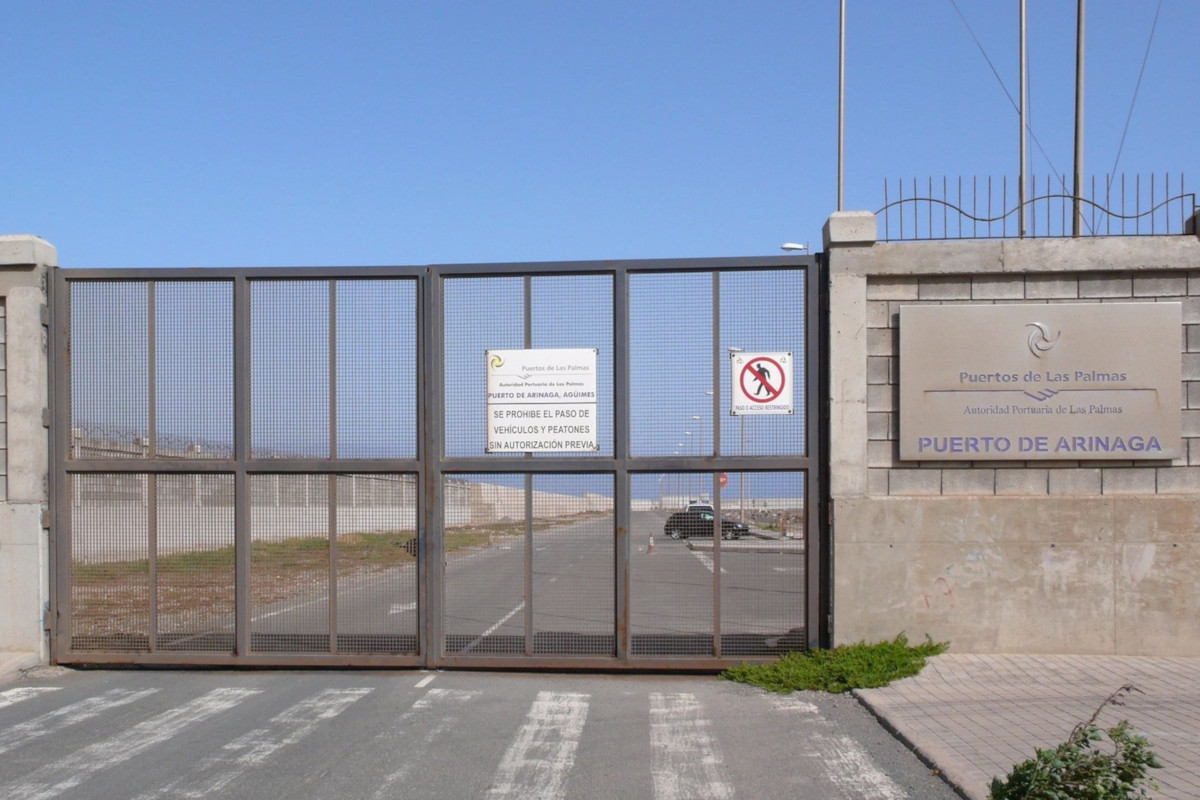To SAR or not to SAR, part 1: Why is Frontex expected to save lives at sea?
Topic
Country/Region
15 July 2021
The first in a four-part series looking into the activities and operations of EU border agency Frontex, examining the evolution of the agency’s search and rescue obligations since it was founded in 2004. Many organisations have warned that “protecting borders” may conflict with “protecting lives” and experience suggests that, what are presented as two distinct objectives are, more often than not, part of conflicting policy agendas. The controversial and deadly practices that have been brought into the spotlight by the Aegean allegations are ultimately the result of political decisions that highlight the dubious priorities of the EU, its member states and its agents – Frontex included.
Support our work: become a Friend of Statewatch from as little as £1/€1 per month.

Frontex training for maritime border control. Image: Bundesministerium für europäische und internationale Angelegenheiten, CC BY 2.0
The second part of this analysis is here: To SAR or not to SAR, part 2: Legal firewalls of a very political agency
The uproar provoked by allegations of pushbacks during Frontex’s joint maritime operation in the Aegean Sea produced unprecedented reactions at the highest level of EU institutions. [1] However, long before these attempts to identify the actions, responsibilities, and chains of command in the Aegean, there was longstanding criticism of the opacity surrounding the agency’s border surveillance operations. Behind it all lie questions regarding the effectiveness of human rights safeguards during such operations, and the impunity resulting from the widening gap between the agency’s capacities and its lack of accountability.
The first response to the Aegean allegations was the swift launch of an internal inquiry by the Frontex Management Board. [2] One of the inquiry’s sub-groups was specifically dedicated to “analysis of the legal framework” of Frontex’s surveillance activities and participation in joint operations. In particular, the group requested that the European Commission provide clarification on:
“…the interpretation of certain legal provisions and application of jurisprudence of the ECtHR to the sea borders and the impact of that jurisprudence on the interpretation of provisions of Regulation (EU) 656/2014.”
Regulation 656/2014 establishing rules for the surveillance of the external sea borders in the context of operational cooperation coordinated by [Frontex] [3] – to give the law its full title – binds the agency to certain standards and definitions for its role in operations at sea.
An internal Frontex document leaked in November 2020 [4] lists details of incidents that the agency previously denied had taken place. It does not use the word “pushbacks” for such incidents, opting instead for “prevention of departure”. The document relies on Regulation 656/2014 to define “prevention of departure”, and it is left as a notion with uncertain legal meaning that nonetheless has practical impacts on the right of people to leave a country. [5] The use of the “prevention of departure” categorisation “codifies and transforms situations that could trigger humanitarian and human rights obligations into legitimate practices of border control”. [6]
Frontex's role in search and rescue (SAR) operations was enshrined in the 2016 Regulation that expanded and upgraded the agency’s tasks and powers [7] (a further update to the agency’s mandate came in 2019, with no substantive changes in the area of SAR [8]). The Regulation covers SAR operations launched and carried out in accordance with Regulation 656/2014 and international law that occur during, or as a result of, maritime border surveillance operations. In these circumstances, Frontex is obliged to provide technical and operational assistance to member states and non-EU countries in support of SAR operations. SAR is a specific objective of the operational plan of every Frontex joint maritime operation. For this reason, vessels deployed by Frontex to an operational area are also always ready to provide national authorities with support in SAR operations. However, the mandate to conduct SAR operations remains a competence of the member states alone. [9]
Over the past few months, exchanges of letters [10] and public hearings [11] have revealed to the general public the multiplicity of stakeholders that must be consulted to establish the facts, clarify chains of command and identify causal links in border surveillance and control operations. The degree of responsibility of Frontex in what is commonly referred to as an ‘incident’ is not, it seems, easy to establish.
1. Frontex’s SAR obligations: blurred boundaries since 2010
1.1. The early years: identified shortcomings no obstacle to strategic border surveillance deployments
Although absent from the agency’s first mandate, [12] SAR responsibilities during Frontex’s maritime operations were increasingly discussed as the number of people reaching EU territory by sea grew in visibility and numbers.
In December 2005, the Council of the EU adopted the Global Approach to Migration, stating that recent developments in the Western Mediterranean required policy engagement to, inter alia, “reduce illegal migration flows and the loss of lives”. In this document, Frontex was called on to “launch a feasibility study on reinforcing monitoring and surveillance of the southern maritime border of the EU… and on a Mediterranean Coastal Patrols Network involving EU Member States and North African countries”. [13]
In May 2007, the European Commission published a study pointing out the need to clarify interception, SAR and disembarkation responsibilities between member states so as to “reinforce the effectiveness, if necessary, of the joint operations carried out by FRONTEX with the aim of preventing and re-directing illegal immigration arriving by sea, in which authorities from different Member States take part and which do not always have a common understanding of how and when to carry out interceptions.” From the very outset, Frontex has been presented as a technical facilitator of cooperation between member states operating in a legal context regarding disembarkation, interception and SAR that the Commission urged member states to clarify and harmonise.
The European Border Patrols Network [14] was created shortly after and deployed at the EU’s external sea border to “detect emergencies at sea, thus reducing the loss of lives.” As early as 2007, the causal link between detection of vessels in distress and saving lives was thus very clearly established. However, cooperation in this area was doomed to be dysfunctional, as no harmonised binding rules were developed to act on this link. In particular, two major elements, still unresolved today, would hamper any form of coordination:
- heterogeneous legal frameworks on SAR across major states sharing maritime borders (for example. Italy and Malta are not signatories of the same version of the SOLAS Convention); and
- the rule of the ‘first country of asylum’ resulting from the Dublin II Regulation (last revised in 2013 with an update now stuck in legislative limbo for years).
Yet no communication from Frontex at the time seemed to suggest any form of uneasiness when operating in such context; joint maritime operations were conducted regardless. Eager to build up its credibility as a newly-established border management agency, Frontex aligned itself from the outset with a policy geared towards the “tackling of illegal migration”.
This bias was soon identified as overshadowing a number of human rights obligations, with concrete consequences for procedural rights including the right to asylum during maritime operation, as stressed in a report commissioned by the Greens/EFA group in the European Parliament in 2010:
“The Agency’s annual reports focus deliberately on statistical results in terms of detection, apprehension and “refusal of entry of illegal immigrants” at the main borders of the EU... The 2007 report, for example, states that 130,000 third-country nationals were refused entry to the EU; in the 2008 report the figure is 140,000. Neither report mentions the possible presence among those refused entry of potential asylum seekers or vulnerable individuals (lone minors, etc.). The specific protection needs of migrants do not appear to be taken into account, and nowhere is reference made to the principle of non-refoulement…” [15]
Throughout the years, from the Canary Islands to the Central Mediterranean, a number of ‘incidents’ at sea made clear the growing number of shipwrecks, deaths and disappearances. The documents produced following meetings of the EU Justice and Home Affairs Council contain constant references to the issue, yet there has been no urgent action. The intensification of Frontex’s presence at the external borders, thanks to a constant reinforcement by the EU institutions of its financial, technical and operational capacities, has increasingly exposed the agency’s structural lack of clarity, binding procedures, and harmonised standard practices. Strikingly, the agency has never considered such shortcomings as hampering its deployment capacity or ability to implement its mandate which, initially, did not contain any reference to SAR guidelines, let alone obligations.

An extraordinary meeting of the Justice and Home Affairs Council to discuss the "migratory situation" in September 2015. Image: European External Action Service, CC BY-NC 2.0
1.2. Clarifying tasks: border surveillance, support to member states and cooperation with third countries
In 2010, the Council of the EU adopted Decision 252/2010. [16] This supplemented the Schengen Borders Code [17] in response to mounting concerns regarding human rights violations during maritime border control operations. The Decision aimed to clarify the rules applicable to interceptions at sea (binding part, Annex I) and SAR and disembarkation (non-binding part, Annex II) and were later inserted in the mandate of the agency through amendments approved in 2011. [18] An important line was crossed with the adoption of this Decision: it provided the possibility for the agency to disembark migrants intercepted at sea in a non-EU country. [19]
The Decision survived until 2014, when it was annulled by the Court of Justice of the EU after the European Parliament successfully challenged the procedure by which it was adopted (unilaterally by the Council). [20] The procedure was not the only problem, however. In 2012, pending the judgment, the General Advocate of the Court issued a preliminary opinion in which it was stressed that the non-binding guidelines for SAR set out in the Decision “govern[ed] aspects of the operation that do not fall within Frontex’s duties”. [21]
The Decision was subsequently replaced by Regulation 656/2014, adopted by both the Council and the Parliament. Its passage through the institutions provoked substantial debates and contributions from legal experts and human rights organisations. The text, adopted in the wake of a terrible increase in the number of shipwrecks, deaths and disappeared at sea, [22] was welcomed as providing “search-and-rescue rules to prevent deaths at sea,” [23] fuelling a belief that Frontex would now conduct SAR operations. But was this the case?
Legal experts have pointed out a number of shortcomings in the Regulation. [24] In particular, the text makes a point of providing a clear definition as to what should be considered as a vessel in distress – namely, one in a situation requiring the launch of SAR operations – while vessels in a “state of alert” or “a state of uncertainty” may simply be monitored from afar, with no need to provide support. They may even be re-routed by being manoeuvred outside of the territorial waters of the EU’s member states.
These definitions were denounced for providing a fig leaf of legitimacy for the avoidance and escapism too often reported at sea, including by Frontex. Conversely, other fundamental notions with respect to the right of asylum seemed to leave a large margin of appreciation, with significant consequences for migrants in danger at sea. For example, although the text reaffirmed and reinforced the requirement to fully respect to the principle of non-refoulement (a clear reference to the 2012 European Court of Human Rights ruling in Hirsi Jamaa v. Italy [25]), no clarity is provided as to who is to determine whether a country is safe or unsafe for the disembarkation of rescued persons. This is a particularly serious omission given that the nearest port of safety could be located in a non-EU country (if an operation is conducted in a contiguous zone or in international waters). It is all the more concerning given how it echoes a point made in 2009 by Frontex’s former deputy executive director, in an attempt to reject responsibility for the push-back of migrants to Libya:
“Our agency does not have the ability to confirm if the right to request asylum as well as other human rights are being respected in Libya.” [26]
Since then, Frontex’s annual reports on the implementation of Regulation 656/2014 have consistently argued that disembarkation in a non-EU country is never envisaged in the operational plan drawn up for each joint operation. It is worth stressing here that operational plans are not public and that formal requests for their publication (for example, from civil society organisations or journalists) are regularly rejected, even after an operation has been completed. The agency has also stressed many times that it has never conducted maritime surveillance operations outside of EU territorial waters: pursuant to Regulation 656/2014, migrants intercepted or rescued in those waters should be disembarked in EU territory. [27]
However, Regulation 656/2014 also regulates the applicable framework during interceptions on the high seas (article 7) and in the contiguous zones (article 8). Contrary to the scope of the Regulation, no reference is made in articles 7 and 8 to the ‘participating units’ which are referred to throughout the other articles. Instead, articles 7 and 8 refer to host and participating member states only. What precisely the ‘participating units’ are is, interestingly, not defined in the text. Why such a distinction? The exact purpose is unclear but one may infer that articles 7 and 8 aim to establish that only member states’ responsibility is invoked during a joint operation coordinated by Frontex leading to an interception on the high seas and in the contiguous zone. If that interpretation is correct, it may also be inferred that the agency’s responsibility is potentially engaged when interceptions are conducted in the EU waters.
During a hearing in the European Parliament’s civil liberties committee (LIBE) following the publication of the pushback allegations, Fabrice Leggeri’s comments on “interception” implied that if the host state of a joint operation does not define an incident in which an unseaworthy vessel is approaching national waters as a rescue situation, the agency and host state can legitimately “intercept” that vessel and prevent it reaching EU territory. Sira Rego, an MEP for The Left group, questioned how Frontex or Greece could consider the intervention of a military vessel, at night, against a plastic boat, pushing it back to Turkish waters, as fitting within the international legal and human rights frameworks as “interception”.
1.3. The widening gap between the mandate and the reality
Much was expected from the 2016 recast of the agency’s mandate, with some hoping that it might provide an opportunity for the newly appointed Commission to keep its promise of “saving lives and securing European borders” set out in the 2015 EU Agenda on Migration. After the suspension of the Italian SAR operation Mare Nostrum in October 2014, the response of the EU institutions and member states provoked severe criticism and disappointment. As European citizens and the world watched on with horror as the deaths at sea continued, the launch of the Frontex joint operation Triton, combined with the launch of the military operation EU Naval Force Mediterranean (later Operation Sophia), clearly led to the militarisation of the Mediterranean in contradiction with humanitarian needs.
Although Frontex stated many times that it was not a SAR agency, it could no longer avoid the ‘SAR agenda’ that reality imposed on its operations, as with all vessels deployed at sea. The ambiguity regarding its mandate was certainly maintained by its formal re-branding in 2016 as the European Border and Coast Guard Agency [emphasis added]. Unwittingly or not, the title and the duties remain blurred to the general public: Frontex’s mandate is about coordinating coast guards and supporting member states during maritime joint operations – including by providing help to vessels in distress if faced with such a situation during a border surveillance operation.
At the same time, the agency clearly feels increasingly obliged to justify how its activities contribute to saving lives at sea, as illustrated in numerous press releases, glossy brochures and press conferences – albeit counterbalanced by reminders that Frontex is “not a SAR agency”. The insistence on the fact that “protecting lives is a priority” [28] have the ring of a counter-narrative against critics accusing Frontex of putting the lives of migrants at the external borders in danger.
Faced with severe attacks over the years for doing just that, along with denying access to EU territory at all costs, the agency’s communication is used at length to counter such a negative image, by presenting itself as both a protector of the lives of migrants and EU borders (“saving lives at sea and targeting criminal networks”):
“We are present at the external borders of the EU, including in pre-frontier areas such as the Mediterranean, contributing to a comprehensive situational picture, and at the same time saving lives thanks to our real-time monitoring and quick reaction capabilities.” [29]
“Over 538 900 people have been rescued in the Mediterranean since 2016 thanks to these operations.” [30]
This feeling that Frontex needs to justify its actions and account for the number of lives saved at sea where its operations are deployed is not new, although it provides a change of direction from the previous approach – as if the agency gradually felt obliged to claim credit for saving lives at sea, probably in response to mounting criticism targeted its action. In 2012, Frontex’s then-Executive Director, Illka Laitinen, was questioned about SAR operations by the LIBE committee:
“I try to avoid giving the impression that I’m somehow sneaking out of responsibility. The lawyers have their views and the practitioners have their views. But the ultimate responsibility is very clear: it’s always with the national competent authority of the [host] Member State.” [31]

“I try to avoid giving the impression that I’m somehow sneaking out of responsibility" - former Frontex Executive Directo, Illka Laitinen. Image: EPP Group, CC BY-ND 2.0
While Frontex is not mandated to initiate and conduct SAR operations, it is nevertheless the case that some lives are saved during the maritime border surveillance operations that it conducts. In fact, the agency has taken up the habit of providing annual figures of the number of migrants saved at sea in its annual report, for instance when looking back at the year 2019:
“The vessels in maritime operations helped to rescue more than 28,670 migrants during their patrolling activities.” [32]
What may sound clear on the paper (Frontex is not a SAR agency) is at odds with the political reality of men, women and children increasingly disappearing and losing their lives in the Mediterranean – the “deadliest sea for migrants”, as it was tragically labelled by the United Nations in 2017. [33] The prioritisation of border control over saving lives, with SAR constituting a secondary goal as per the Integrated Border Management strategy which is reflected in Frontex’s mandate, has had serious consequences on people’s lives and rights, reflecting a structural issue raised by isolated civil society reports in the early 2000s. The association of irregular or, rather, unauthorised migration with internal security issues inherently corrupts the very human rights approach meant to be mainstreamed in EU policies, including in Frontex’s mandate and activities: not only is search and rescue a secondary objective (and only because it is imposed by international law), but the entry and presence of migrants irregularly at the EU’s external borders and in the EU’s territory is perceived, presented and responded to as an element of insecurity. To put it bluntly: why protect a source of instability, if not of danger?
Concluding remarks
Could it be that Frontex’s critics are missing the point in expecting Frontex to perform tasks that the agency is not mandated to do so? Is Frontex the victim of a misunderstanding of its mission?
After years of discussion, litigation and policy amendments regarding SAR and the principle of non-refoulement, since 2015 the Mediterranean has come to epitomize the EU’s border management regime in the eyes of the general public. Over time, the crux of the issue – the distinction between protecting borders and protecting lives – has become ever-clearer. However, while the latter would be the obvious priority to most people, it is in fact one of two clearly distinguished policy goals and a mere derivative of border control, not a primary objective. This is explicitly stated in the very first indent of Regulation 656/2014:
“The objective of Union policy in the field of the Union external borders is to ensure the efficient monitoring of the crossing of external borders including through border surveillance, while contributing to ensuring the protection and saving of lives. The purpose of border surveillance is to prevent unauthorised border crossings, to counter cross-border criminality and to apprehend or take other measures against those persons who have crossed the border in an irregular manner.” [emphasis added]
Frontex was established to achieve this primary goal. Many organisations have warned that “protecting borders” may conflict with “protecting lives” (surveiller n’est pas veiller sur [34]) and experience suggests that, what are presented as two distinct objectives are, more often than not, part of conflicting policy agendas. Beyond the legal frameworks intended to save lives that are applicable to any vessel navigating at sea – including those deployed by Frontex – the controversial and deadly practices that have been brought into the spotlight by the Aegean allegations are ultimately the result of political decisions that highlight the dubious priorities of the EU, its member states and its agents – Frontex included.
Marie Martin
Read the second part of this analysis: To SAR or not to SAR, part 2: Legal firewalls of a very political agency
Endnotes
[1] https://www.statewatch.org/observatories/frontex/frontex-under-scrutiny-inquiries-and-investigations-november-2020-onwards/; https://www.statewatch.org/news/2020/october/frontex-to-carry-out-internal-inquiry-into-allegations-of-direct-involvement-in-pushbacks/
[2] The Management Board Working Group on Fundamental Rights and Legal and Operational Aspects of Operations.
[3] https://eur-lex.europa.eu/legal-content/en/ALL/?uri=celex:32014R0656
[4] https://www.efsyn.gr/ellada/dikaiomata/270551_mazi-epanaproothoyn-mazi-sygkalyptoyn
[5] https://www.law.ox.ac.uk/research-subject-groups/centre-criminology/centreborder-criminologies/blog/2021/01/validating-border
[6] https://www.law.ox.ac.uk/research-subject-groups/centre-criminology/centreborder-criminologies/blog/2021/01/validating-border
[7] https://eur-lex.europa.eu/legal-content/EN/TXT/?uri=CELEX:32016R1624
[8] https://eur-lex.europa.eu/legal-content/en/TXT/?uri=CELEX:32019R1896
[9]https://www.europarl.europa.eu/RegData/etudes/BRIE/2021/659442/EPRS_BRI(2021)659442_EN.pdf
[10] https://www.statewatch.org/news/2021/march/eu-pushbacks-scandal-frontex-correspondence-with-national-and-eu-authorities/
[11] https://www.statewatch.org/news/2021/february/frontex-european-parliament-scrutiny-group-begins-inquiry-into-rights-violations-allegations/
[12] https://eur-lex.europa.eu/legal-content/EN/TXT/PDF/?uri=CELEX:32004R2007&from=EN
[13] https://data.consilium.europa.eu/doc/document/ST-15744-2005-INIT/en/pdf
[14] https://ec.europa.eu/commission/presscorner/detail/en/IP_07_702
[15] p.48 https://www.migreurop.org/IMG/pdf/Frontex-PE-Mig-ENG.pdf
[16] https://eur-lex.europa.eu/legal-content/EN/TXT/?uri=CELEX:32010D0252
[17] https://eur-lex.europa.eu/legal-content/en/TXT/?uri=CELEX%3A32016R0399
[18] https://www.statewatch.org/observatories/frontex/legal-basis/amending-the-2007-legislation-regulation-1168-2011/
[19] Point 2.1 of Annex II, https://eur-lex.europa.eu/LexUriServ/LexUriServ.do?uri=OJ:L:2010:111:0020:0026:EN:PDF
[20] https://www.statewatch.org/media/documents/news/2012/may/ecj-schengen-borders.pdf
[21] https://www.statewatch.org/media/documents/news/2012/may/ecj-schengen-borders.pdf
[22] https://www.statewatch.org/observatories/the-refugee-crisis-a-humanitarian-emergency/
[23] https://www.europarl.europa.eu/news/en/press-room/20140411IPR43463/migrants-parliament-approves-search-and-rescue-rules-to-prevent-deaths-at-sea
[24] https://www.statewatch.org/media/documents/analyses/no-224-frontex-sea-operations.pdf; http://www.frontexit.org/en/docs/98-report-green-light-to-fundamental-rights-violations/file
[25] https://hudoc.echr.coe.int/eng#{%22itemid%22:[%22001-109231%22]}
[26] https://www.migreurop.org/IMG/pdf/Frontex-PE-Mig-ENG.pdf
[27] Regulation 2019/189, Article 10
[28] Work Programme 2020-2022
[29] p.20, https://frontex.europa.eu/assets/Publications/General/In_Brief_2020/20.0147_inbrief_2020_11th_web_fixed4.pdf
[30] https://www.consilium.europa.eu/en/policies/migratory-pressures/saving-lives-at-sea/
[31] https://www.statewatch.org/media/documents/analyses/200-frontex-search-rescue.pdf
[32] p.15, https://frontex.europa.eu/assets/Key_Documents/Annual_report/2019/General_Report_2019.pdf
[33] https://news.un.org/en/story/2017/11/637162-mediterranean-crossing-still-worlds-deadliest-migrants-un-report
[34] Frontex, poison or antidote to the tragedies in the Mediterranean?, Frontexit, 25 February 2015, in EN and in FR https://www.frontexit.org/en/news/item/552-frontex-poison-or-antidote-to-the-tragedies-in-the-mediterranean
Our work is only possible with your support.
Become a Friend of Statewatch from as little as £1/€1 per month.
Spotted an error? If you've spotted a problem with this page, just click once to let us know.

